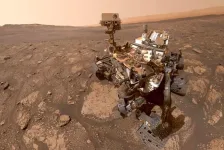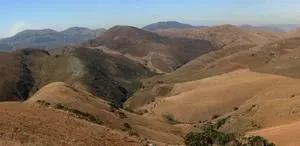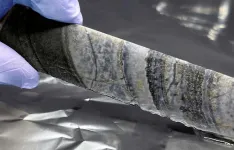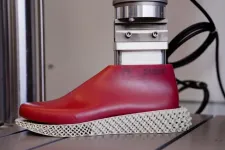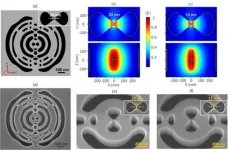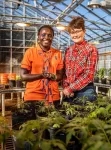(Press-News.org) New research shows that atmospheric pressure fluctuations that pull gases up from underground could be responsible for releasing subsurface methane into Mars’ atmosphere; knowing when and where to look for methane can help the Curiosity rover search for signs of life.
“Understanding Mars’ methane variations has been highlighted by NASA’s Curiosity team as the next key step towards figuring out where it comes from,” said John Ortiz, a graduate student at Los Alamos National Laboratory who led the research team. “There are several challenges associated with meeting that goal, and a big one is knowing what time of a given sol (Martian day) is best for Curiosity to perform an atmospheric sampling experiment.”
The paper was published the week of Jan. 22 in the Journal of Geophysical Research: Planets.
A primary focus of NASA’s Mars missions, including Curiosity and Perseverance, is to detect and understand past or present signs of life, such as methane. However, with the source of methane on Mars likely being underground, short-term variations in atmospheric methane levels have posed a research challenge.
To better understand Mars’ methane levels, Ortiz and his team used high-performance computing clusters to simulate how methane travels through networks of underground fractures and is released into the atmosphere, where it then mixes within the atmospheric column. They also modeled how methane is adsorbed onto the pores of rocks, which is a temperature-dependent process that may contribute to the methane level fluctuations.
Their simulations predicted methane pulses from the ground surface into the atmosphere just before the Martian sunrise in the planet’s northern summer season, which just recently ended. This corroborates previous rover data suggesting that methane levels fluctuated not only seasonally, but also daily.
This valuable data is helping inform the Curiosity rover’s ongoing sampling campaign.
“Our work suggests several key time windows for Curiosity to collect data. We think these offer the best chance of constraining the timing of methane fluctuations, and (hopefully) down the line bringing us closer to understanding where it comes from on Mars,” Ortiz said.
Paper: “Sub-diurnal methane variations on Mars driven by barometric pumping and planetary boundary layer evolution.” Journal of Geophysical Research: Planets. DOI: 10.1029/2023JE008043
END
Atmospheric pressure changes could be driving Mars’ elusive methane pulses
Simulations will help Curiosity search for signs of past or present life on the Red Planet
2024-01-24
ELSE PRESS RELEASES FROM THIS DATE:
New pieces in the puzzle of first life on Earth
2024-01-24
Microorganisms were the first forms of life on our planet. The clues are written in 3.5 billion-year-old rocks by geochemical and morphological traces, such as chemical compounds or structures that these organisms left behind. However, it is still not clear when and where life originated on Earth and when a diversity of species developed in these early microbial communities. Evidence is scarce and often disputed. Now, researchers led by the University of Göttingen and Linnӕus University in Sweden have uncovered key findings about the earliest forms of life. In rock ...
Post pandemic, US cardiovascular death rate continues upward trajectory
2024-01-24
Ann Arbor, January 24, 2024 – New research confirms what public health leaders have been fearing: the significant uptick in the cardiovascular disease (CVD) death rate that began in 2020 has continued. The continuing trend reverses improvements achieved in the decade before the COVID-19 pandemic to reduce mortalities from heart disease and stroke, the leading causes of death in the United States. The findings are reported in the American Journal of Preventive Medicine, published by Elsevier.
Investigators from the US Centers for Disease Control and Prevention ...
New model predicts how shoe properties affect a runner’s performance
2024-01-24
A good shoe can make a huge difference for runners, from career marathoners to couch-to-5K first-timers. But every runner is unique, and a shoe that works for one might trip up another. Outside of trying on a rack of different designs, there’s no quick and easy way to know which shoe best suits a person’s particular running style.
MIT engineers are hoping to change that with a new model that predicts how certain shoe properties will affect a runner’s performance.
The simple model incorporates ...
Sub-wavelength confinement of light demonstrated in indium phosphide nanocavity
2024-01-24
WASHINGTON — As we transition to a new era in computing, there is a need for new devices that integrate electronic and photonic functionalities at the nanoscale while enhancing the interaction between photons and electrons. In an important step toward fulfilling this need, researchers have developed a new III-V semiconductor nanocavity that confines light at levels below the so-called diffraction limit.
“Nanocavities with ultrasmall mode volumes hold great promise for improving a wide range of photonic ...
Laura M. Barzilai, JD, LLM, elected Chair of Board of Directors of the American Federation for Aging Research (AFAR)
2024-01-24
NEW YORK— The American Federation for Aging Research (AFAR), a national, nonprofit whose mission is to advance and support healthy aging through biomedical research, is pleased to announce the election of Laura M. Barzilai, JD, LLM, as Chair of the Board of Directors.
Stephanie Lederman, EdM, AFAR Executive Director, shares: "The Board of Directors of AFAR unanimously elected Laura Barzilai as Chair in December 2023. For nearly a decade, her contributions as a board member, committee chair, ...
Talking tomatoes: How their communication is influenced by enemies and friends
2024-01-24
Plants produce a range of chemicals known as volatile organic compounds that influence their interactions with the world around them. In a new study, researchers at the University of Illinois Urbana-Champaign investigated how the type and amount of these VOCs change based on different features of tomato plants.
The smell of cut grass is one of the defining fragrances of summer. Smells like that are one of the ways plants signal their injury. Because they cannot run away from danger, plants have evolved to communicate with each other using chemical signals. They use VOCs for a ...
Thomas A. Rando, MD, PhD, elected President of the Board of Directors of the American Federation for Aging Research (AFAR)
2024-01-24
The American Federation for Aging Research (AFAR), a national, nonprofit whose mission is to advance and support healthy aging through biomedical research, is pleased to announce the election of Thomas A. Rando, MD, PhD, as President of the Board of Directors in December 2023.
Dr. Rando is currently the Director of the Eli and Edythe Broad Center of Regenerative Medicine and Stem Cell Biology at UCLA, where he is a professor of Neurology and Molecular, Cell, and Developmental Biology. Previously, he ...
Fast-charging lithium battery seeks to eliminate ‘range anxiety’
2024-01-24
ITHACA, N.Y. – Cornell University engineers have created a new lithium battery that can charge in under five minutes – faster than any such battery on the market – while maintaining stable performance over extended cycles of charging and discharging.
The breakthrough could alleviate “range anxiety” among drivers who worry electric vehicles cannot travel long distances without a time-consuming recharge.
“Range anxiety is a greater barrier to electrification in transportation than any of the other barriers, like cost and capability of batteries, and we have identified a pathway to eliminate it using rational electrode designs,” said Lynden ...
Chemistry professor R. Graham Cooks expands research of water droplet interfaces that offer the secret ingredient for building life
2024-01-24
R. Graham Cooks, the Henry B. Hass Distinguished Professor of Chemistry, and his postdoctoral researcher Lingqi Qiu have experimental evidence that the key step in protein formation can occur in droplets of pure water, and have recently published these findings in the Proceedings of the National Academy of Sciences (PNAS).
In this key step, amino acids are dehydrated (they lose water) even though they are in a water solution, a paradox that is resolved by the fact that these droplet surfaces are unusually dry and highly ...
Brain mechanism teaches mice to avoid bullies
2024-01-24
Like humans, mice live in complex social groups, fight over territory and mates, and learn when it is safer to avoid certain opponents. After losing even a brief fight, the defeated animals will flee from the mice that hurt them for weeks afterward, a new study shows.
Led by researchers at NYU Grossman School of Medicine, the study reveals that such “retreating behavior” is influenced by a distinct area on the underside of the hypothalamus, a part of the brain that controls hunger, sleep, and levels of many hormones. The team had previously found that this special region, called the anterior ventrolateral part of the ventromedial hypothalamus (aVMHvl), ...
LAST 30 PRESS RELEASES:
Gut microbiome connected with heart disease precursor
Nitrous oxide, a product of fertilizer use, may harm some soil bacteria
FAU lands $4.5M US Air Force T-1A Jayhawk flight simulator
SimTac: A physics-based simulator for vision-based tactile sensing with biomorphic structures
Preparing students to deal with ‘reality shock’ in the workplace
Researchers develop beating, 3D-printed heart model for surgical practice
Black soldier fly larvae show promise for safe organic waste removal
People with COPD commonly misuse medications
How periodontitis-linked bacteria accelerate osteoporosis-like bone loss through the gut
Understanding how cells take up and use isolated ‘powerhouses’ to restore energy function
Ten-point plan to deliver climate education unveiled by experts
Team led by UC San Diego researchers selected for prestigious global cancer prize
Study: Reported crop yield gains from breeding may be overstated
Stem cells from human baby teeth show promise for treating cerebral palsy
Chimps’ love for crystals could help us understand our own ancestors’ fascination with these stones
Vaginal estrogen therapy not linked to cancer recurrence in survivors of endometrial cancer
How estrogen helps protect women from high blood pressure
Breaking the efficiency barrier: Researchers propose multi-stage solar system to harness the full spectrum
A new name, a new beginning: Building a green energy future together
From algorithms to atoms: How artificial intelligence is accelerating the discovery of next-generation energy materials
Loneliness linked to fear of embarrassment: teen research
New MOH–NUS Fellowship launched to strengthen everyday ethics in Singapore’s healthcare sector
Sungkyunkwan University researchers develop next-generation transparent electrode without rare metal indium
What's going on inside quantum computers?: New method simplifies process tomography
This ancient plant-eater had a twisted jaw and sideways-facing teeth
Jackdaw chicks listen to adults to learn about predators
Toxic algal bloom has taken a heavy toll on mental health
Beyond silicon: SKKU team presents Indium Selenide roadmap for ultra-low-power AI and quantum computing
Sugar comforts newborn babies during painful procedures
Pollen exposure linked to poorer exam results taken at the end of secondary school
[Press-News.org] Atmospheric pressure changes could be driving Mars’ elusive methane pulsesSimulations will help Curiosity search for signs of past or present life on the Red Planet
